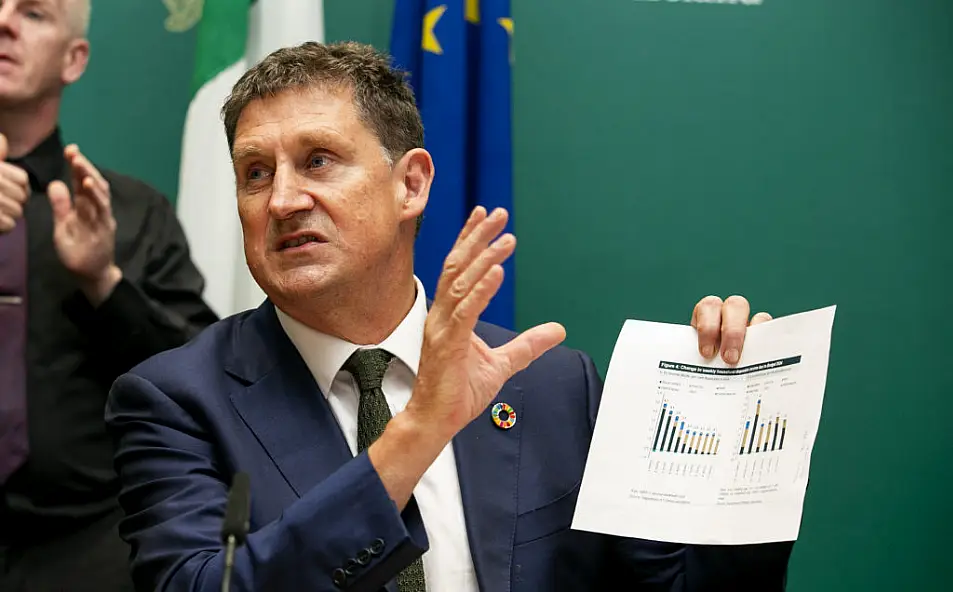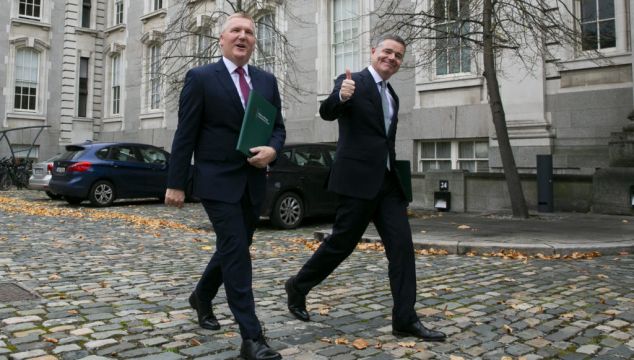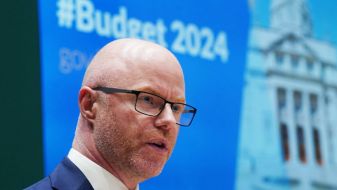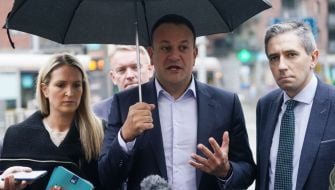Updated at 8.24pm
Budget Day 2024 has come and gone with a range of new measures announced by Minister for Finance Michael McGrath and Minister for Public Expenditure Paschal Donohoe.
They mainly centred around changes to tax rates and mortgage relief as well as supports for renters.
You can check out all the announcements below.
Main points:
- Lower rate (20 per cent) band for income tax will increase from €40,000 to €42,000
- Universal Social Charge (USC) 4.5 per cent rate will reduce to 4 per cent
- USC's 2 per cent rate band will expand to include income up to €25,760
- Mortgage interest tax relief to be offered on increased interest payment amounts for 2023, capped at €1,250
- Renters' credit increased to €750
- Weekly increase of €12 for social protection payments
- Funding for 1,000 additional gardaí and 250 civilian support staff
- Minimum wage to increase by €1.40
Minister for Finance Michael McGrath and Minister for Public Expenditure Paschal Donohoe have finished announcing Budget 2024 in the Dáil.
Here are the main points as it happened...
Mr McGrath opened by saying the State currently has a window of opportunity that we must grasp, adding that Budget 2024 will be a "step-change in how we plan for the future".
He said the Department of Finance estimates inflation for this year will be just over 5.25 per cent, falling to 2.9 per cent next year.
Mr McGrath added that a general government surplus of €8.8 billion is projected for this year, and €8.4 billion for next year.
Government debt is expected to be under €200 billion by the end of the decade.
Budget 2024 will total €6.4 billion, made up of €5.3 billion in core expenditure and €1.1 billion in tax measures.
Once-off cost-of-living measures will total €2.7 billion, while non-core expenditure will total €4.75 billion, including an additional €250 million for the public capital programme funded by windfall corporation tax receipts.
The standard rate cut-off point for income tax will be increased to €42,000.
The personal, Employee PAYE and earned income tax credits will each be increased by €100.
Meanwhile, the Universal Social Charge (USC) will be changed so 2 per cent will be charged on income up to €25,760, up from €22,920, while the 4.5 per cent rate will reduce to 4 per cent.
The minimum hourly wage will increase by €1.40, bringing it to €12.70, and Pay Related Social Insurance (PRSI) contributions will also increase by 0.1 per cent from October next year.

The planned increase in excise duty for petrol, diesel and marked gas will be put off until next year. The increase will instead take place in two equal parts in April and August.
A mortgage interest tax relief will be offered for those with a mortgage balance of between €80,000 and €500,000 as of the end of December 2022.
The relief will be offered on the increased interest amounts in 2023 compared to the previous year, capped at €1,250.
Mr McGrath said the measure will benefit an estimated 165,000 mortgage-holders, costing €125 million.
The Help to Buy scheme will also be extended to the end of 2025 and the renter' credit will be increased to €750.
There will be a temporary tax relief for small landlords over the next four years.
Rental income of €3,000 for 2024 will be disregarded for income tax, increased to €4,000 in 2025 and €5,000 in 2026 and 2027.
In order to avail of the measure, landlords must keep their property in the rental market for the four-year period, and if they fail to do so, the relief amount will be clawed back.
The Minister also announced an increase to the vacant homes tax, which will rise to five times the amounts of property's local property tax rate.
The carbon tax will increase from €48.50 per tonne to €56 per tonne from October 11th.
The measure will add 2.5c and 2.1c to diesel and petrol respectively.
Mr McGrath said the money raised by the carbon tax will be in part used to fund the national retrofitting programme, and support farmers in the green transition.
The bank levy will be revised to raise €200 million next year.
The levy will be reviewed once again next year.
The price of a packet of cigarettes will jump 75c, bringing the average pack to €16.75. A pro-rata increase will also apply to other tobacco products.
A new domestic tax will also be introduced on e-cigarettes.
Mr McGrath has given further details on two funds he mentioned earlier in his budget speech.
The Future Ireland Fund will be established to fund the future costs of the State. He said it is not a 'Rainy Day' fund as it will cover costs we know are coming down the line.
He added 0.8 per cent of the State's annual Gross Domestic Product (GDP) will be placed in the Future Ireland Fund each year from 2024 to 2035.
A second fund – the Infrastructure, Climate and Nature Fund – will also be established, using some of the windfall corporate taxes.
The fund is projected to grow by €2 billion annually over the next seven years, the first €2 billion of which will be drawn from the existing National Reserve Fund.
Taking over from Mr McGrath, Mr Donohoe kicked off his speech by confirming three energy credits of €150 will be provided to households.
The three credits will be rolled out between the end of this year and next April.
He added a €300 lump sum payment will be made to those in receipt of the fuel allowance.
Mr Donohoe also announced a number of measures for social protection payments.
Across the board, weekly social protection payments will increase by €12.
A €200 lump sum payment will be paid to those in receipt of the Living Alone Allowance, while those in receipt of the Carers Allowance, Disability Allowance and Domiciliary Care Allowance will receive a €400 payment before Christmas.
A double Child Benefit payment will also be made before Christmas, as will a double Foster Care Benefit payment.
A once-off double-week payment will be paid to all social protection recipients, while Mr Donohoe also confirmed the Christmas bonus will be paid in early December.
The weekly income threshold for the Working Family Payment will also increase by €54.
Focusing on measures for children and students, Mr Donohoe confirmed Child Benefit payments will be expanded to include 18-year-olds who are in full-time education.
The Hot School Meals programme will also be expanded to include a further 900 primary schools, and the free schoolbook scheme will be expanded to cover students up to the end of the Junior Cycle of secondary school.
Allocating €10.5 billion to the Department of Education, Mr Donohoe said 740 teaching posts will be added to support students with special educational needs, in addition to 1,200 further Special Needs Assistants (SNAs).
A total of €67 million will be provided for craft apprenticeships, growing capacity to over 16,000 place for 2024.
Mr Donohoe also confirmed the fee waiver on school transport will be extended for another year, as will the fee waiver for those sitting State exams.
In addition, the Minister announced a once-off €1,000 reduction to the student contribution for free-fees students, a once-off reduction of around a third in the contribution fee for apprentices in higher education, and an increase in the Post Graduate Tuition fee contribution by €1,000 for student grant recipients.
As part of €338 million for the Department of Children, Mr Donohoe confirmed the second 25 per cent reduction in childcare fees will go ahead, taking effect from September next year.
The Qualified Child Increase will be raised by €4 to €46 per week for under 12s and to €54 per week for over 12s.
The Department of Housing will receive €7 billion, €1.9 billion of which will go towards the delivery of 9,300 new social housing units.
A further €265 million will go to providing 6,400 affordable homes next year.
Mr Donohoe added €207 million will also be spent on bringing vacant and derelict homes back into supply.
Despite a projected €1.1 billion overspend for 2023, the Department of Health has been allocated €22.5 billion for next year.
The delivery of additional health infrastructure will be funded under the National Development Plan, totalling €1.23 billion.
Overall, the National Development Plan will receive €900 million for 2024.
For transport, Mr Donohoe has said the 20 per cent reduction to transport fares will continue to the end of 2024.
Reduced fares under the Young Adult Card will also be extended to include those aged 19 to 25.
Road network works have also been allocated €1.35 billion.
An Garda Síochána will receive funding to recruit 1,000 additional gardaí and 250 civilian staff in specialist roles.
There will also be an additional €25 million made available for the Garda overtime budget.
Meanwhile, €1.23 billion for Defence includes funding for 400 additional Defence Forces personnel and posts to implement reform and cyber-security.







